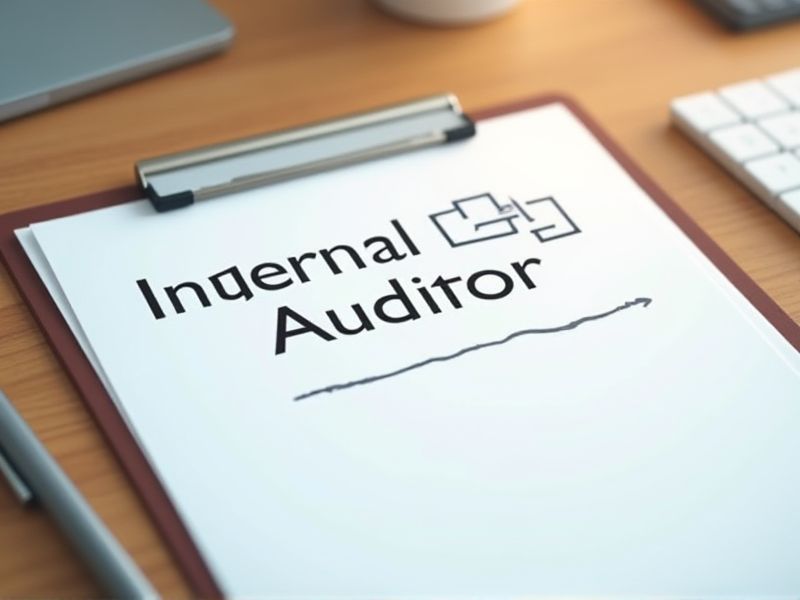
Internal auditors play a critical role in ensuring organizational efficiency and compliance with regulatory standards. Certain certifications enhance their credibility, demonstrating specialized knowledge and proficiency in auditing practices. These credentials help internal auditors in navigating complex financial landscapes, identifying risks, and implementing robust internal controls. Key certifications for internal auditors include Certified Internal Auditor (CIA), Certified Information Systems Auditor (CISA), and Certified Fraud Examiner (CFE).
Certified Internal Auditor (CIA)
Certified Internal Auditor (CIA) designation equips internal auditors with a standardized body of knowledge and skills, fostering consistent quality in auditing practices globally. Companies with CIAs on their auditing teams likely benefit from enhanced risk management capabilities and improved compliance with regulations. The rigorous CIA certification process validates an internal auditor's expertise, increasing their credibility and value within the organization. In competitive markets, having CIAs often correlates with strengthened stakeholder trust and more efficient organizational performance.
Certified Information Systems Auditor (CISA)
A Certified Information Systems Auditor (CISA) qualification equips an internal auditor with critical skills to assess an organization's information technology and business systems effectively. This certification enhances the auditor's understanding of IT governance, aiding in identifying and mitigating risks associated with digital information systems. The recognition of CISA by global organizations increases the credibility and trust in an auditor's expertise. As technology becomes integral to business operations, possessing CISA ensures that internal auditors are adept at auditing complex IT infrastructures.
Certified Fraud Examiner (CFE)
A Certified Fraud Examiner (CFE) enhances the capabilities of an Internal Auditor by bringing specialized skills in detecting fraud schemes. The CFE designation equips auditors with advanced techniques and methodologies to identify and mitigate fraud risks. Internal Auditors with CFE credentials contribute to strengthening an organization's internal controls and compliance culture. Hiring CFEs in internal audit roles can lead to more accurate and timely identification of fraudulent activities, safeguarding assets and reputation.
Certified Government Auditing Professional (CGAP)
Possessing a Certified Government Auditing Professional (CGAP) certification equips an internal auditor with specialized knowledge in government auditing standards, enhancing their ability to handle government-specific regulatory requirements. This certification signals a higher level of proficiency, making auditors more adept at identifying inefficiencies and potential risks within government operations. Pursuing CGAP demonstrates a commitment to ethical practices and continuous improvement, crucial for maintaining transparency and accountability in public sector financial management. Employers recognize the CGAP as a mark of expertise, often leading to expanded career opportunities and increased responsibilities for internal auditors.
Certified Risk Management Assurance (CRMA)
Earning the Certified Risk Management Assurance (CRMA) designation empowers internal auditors with specialized skills to assess and enhance risk management processes within their organizations. This certification allows auditors to provide objective assurance on a company's governance, risk management, and control processes, thereby strengthening overall organizational resilience. Having a CRMA designation can improve an internal auditor's credibility, as it is recognized globally and indicates a higher standard of expertise. The demand for certified professionals in this area continues to rise as organizations face increasingly complex risk landscapes.
Certified Public Accountant (CPA)
A Certified Public Accountant (CPA) designation equips internal auditors with expertise in financial regulations and accounting standards, ensuring accurate evaluations of a company's financial practices. Training and ethical standards required for CPAs enhance the credibility and objectivity of an internal auditor's work. In-depth knowledge in financial analysis provided by CPA education aids internal auditors in identifying operational inefficiencies and potential risks. CPA certification often fulfills employer prerequisites, given that many organizations seek internal auditors with formal accounting credentials.
ISO 31000 Lead Risk Manager
ISO 31000 Lead Risk Manager provides a structured framework for managing risks, aiding Internal Auditors in identifying potential threats more effectively. It emphasizes process consistency, ensuring that auditors maintain a uniform approach to risk assessment. Access to advanced risk management tools supports Internal Auditors in enhancing organizational resilience and decision-making. By aligning with ISO 31000 standards, Internal Auditors improve stakeholder confidence through demonstrable risk mitigation capabilities.
Certified Quality Auditor (CQA)
The Certified Quality Auditor (CQA) certification enhances an Internal Auditor's expertise in quality management principles, leading to more effective audits. CQA provides structured methodologies for evaluating systems and processes, increasing the accuracy of audit findings. Internal Auditors with CQA credentials are more equipped to identify weaknesses in compliance, ensuring organizational standards are met. Organizations benefit from employing CQAs due to the cost savings associated with reduced errors and improved operational efficiency.
Lean Six Sigma Black Belt
A Lean Six Sigma Black Belt equips an Internal Auditor with advanced skills in process improvement and problem-solving, leading to more efficient auditing practices. By understanding data-driven methodologies, the auditor can pinpoint inefficiencies and nonconformities within an organization more precisely. This expertise also helps in reducing operational costs by identifying waste and streamlining processes. Enhanced process optimization techniques bolster the auditor's ability to recommend impactful changes that align with the organization's strategic goals.
Certified Information Systems Security Professional (CISSP)
A CISSP certification enhances an Internal Auditor's understanding of cybersecurity, improving their ability to identify vulnerabilities in an organization's systems. This certification equips auditors with knowledge of information security practices, which is crucial for evaluating and securing data integrity. Organizations facing increased cyber threats value Internal Auditors with CISSP, as their expertise supports robust risk assessments and compliance. Having CISSP credentials can also boost the auditor's credibility, fostering trust in their recommendations for security improvements.
Summary
When you, as an internal auditor, obtain certifications, your professional credibility significantly increases. This leads to broader career opportunities and enhanced job prospects in your field. Acquiring certifications also equips you with advanced skills and knowledge, thereby improving your efficiency and effectiveness at work. Organizations tend to place more trust in your audit findings, leading to greater responsibility and influence in decision-making processes.
